if引导的一般条件句.
if引导的一般条件句
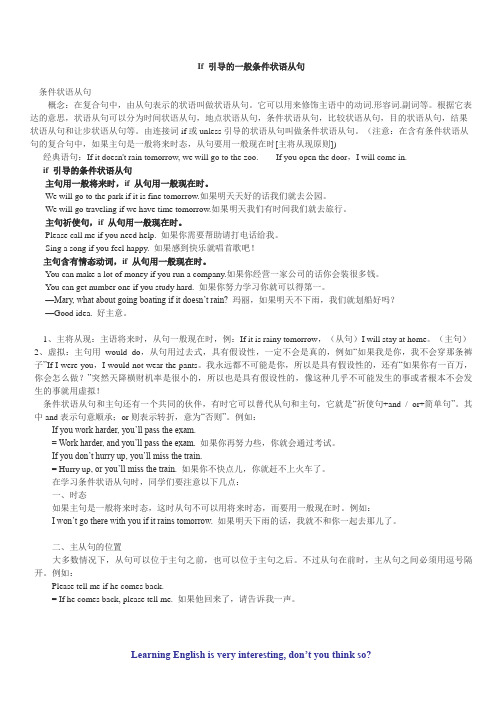
If 引导的一般条件状语从句条件状语从句概念:在复合句中,由从句表示的状语叫做状语从句。
它可以用来修饰主语中的动词.形容词.副词等。
根据它表达的意思,状语从句可以分为时间状语从句,地点状语从句,条件状语从句,比较状语从句,目的状语从句,结果状语从句和让步状语从句等。
由连接词if或unless引导的状语从句叫做条件状语从句。
(注意:在含有条件状语从句的复合句中,如果主句是一般将来时态,从句要用一般现在时[主将从现原则])经典语句:If it doesn't rain tomorrow, we will go to the zoo. If you open the door,I will come in.if 引导的条件状语从句主句用一般将来时,if 从句用一般现在时。
We will go to the park if it is fine tomorrow.如果明天天好的话我们就去公园。
We will go traveling if we have time tomorrow.如果明天我们有时间我们就去旅行。
主句祈使句,if 从句用一般现在时。
Please call me if you need help. 如果你需要帮助请打电话给我。
Sing a song if you feel happy. 如果感到快乐就唱首歌吧!主句含有情态动词,if 从句用一般现在时。
Y ou can make a lot of money if you run a company.如果你经营一家公司的话你会装很多钱。
Y ou can get number one if you study hard. 如果你努力学习你就可以得第一。
—Mary, what about going boating if it doesn’t rain? 玛丽,如果明天不下雨,我们就划船好吗?—Good idea. 好主意。
1、主将从现:主语将来时,从句一般现在时,例:If it is rainy tomorrow,(从句)I will stay at home。
If引导条件句的用法

If 引导条件句的用法1、真实条件句用于陈述语气,假设的情况可能发生,其中if 是如果的意思;时态关系句型:条件从句主句一般现在时shall/will + 动词原形If he comes, he will bring his violin.典型例题The volleyball match will be put off if it ___.A. will rainB. rainsC. rainedD. is rained答案B;真实条件句主句为将来时,从句用一般现在时;注意:1 在真实条件句中,主句不能用be going to表示将来,该用shall, will.错If you leave now, you are never going to regret it.对If you leave now, you will never regret it.2 表示真理时,主句谓语动词便不用shall will +动词原形,而直接用一般现在时的动词形式;2 非真实条件句1时态:可以表示过去,现在和将来的情况;它的基本特点是时态退后;a. 同现在事实相反的假设;句型:条件从句主句一般过去时should would +动词原形If they were here, they would help you.b. 表示于过去事实相反的假设;句型:条件从句主句过去完成时shouldwould have+ 过去分词If she had worked harder, she would have succeeded.The rice would not have been burnt if you had been more careful.If my lawyer had been here last Saturday, he would have prevented me from going.If he had come yesterday, I should / would have told him about it.含义:He did not come yesterday, so I did not tell him about it.If he had not been ill and missed many classes, he would have made greater progress.含义:He was ill and missed many lessons, so he did not make greater progress.c. 表示对将来的假想句型:条件从句主句一般过去时should+ 动词原形were+ 不定式would + 动词原形should+ 动词原形If you succeeded, everything would be all right.If you should succeed, everything would be all right.If you were to succeed, everything would be all right.3 混合条件句主句与从句的动作发生在不同的时间,这时主,从句谓语动词的虚拟语气形式因时间不同而不同,这叫做混合条件句;If you had asked him yesterday, you would know what to do now.从句与过去事实相反,主句与现在事实相反;If it had rained last night 过去, it would be very cold today 现在.4 虚拟条件句的倒装虚拟条件句的从句部分如果含有were, should, 或had, 可将if省略,再把were, should或had 移到从句句首,实行倒装;Were they here now, they could help us.=If they were here now, they could help us.Had you come earlier, you would have met him=If you had come earlier, you would have met him.Should it rain, the crops would be saved.=Were it to rain, the crops would be saved.注意:在虚拟语气的从句中,动词’be’的过去时态一律用"were",不用was,即在从句中be用were代替;If I were you, I would go to look for him.如果我是你,就会去找他;If he were here, everything would be all right.如果他在这儿,一切都会好的;典型例题_____ to do the work, I should do it some other day.A. If were IB. I wereC. Were ID. Was I答案C. 在虚拟条件状语中如果有were, should, had这三个词,通常将if省略,主语提前, 变成were, should, had +主语的形式;但要注意,在虚拟条件状语从句中,省略连词的倒装形式的句首不能用动词的缩略形式;如我们可说Were I not to do., 而不能说Weren’t I to do.5 特殊的虚拟语气词:should1 It is demanded / necessary / a pity + that…结构中的主语从句的谓语动词要用should 加动词原形, should 可省略;句型:1suggestedIt is 2important that…+ should do3 a pity1suggested, ordered, proposed, required, demanded, requested, insisted;+ should do2important, necessary, natural, strangea pity, a shame, no wonder3It is suggested that we should hold a meeting next week.It is necessary that he should come to our meeting tomorrow.2在宾语从句中的应用在表示命令、建议、要求等一类动词后面的从句中;order, suggest, propose, require, demand, request, insist, command, insist + should doI suggest that we should hold a meeting next week.He insisted that he should be sent there.注意:如suggest, insist不表示"建议" 或"坚持要某人做某事时",即它们用于其本意"暗示、表明"、"坚持认为"时,宾语从句用陈述语气;The guard at gate insisted that everybody obey the rules.判断改错:错You pale face suggests that you should be ill.对Your pale face suggests that you are ill.错I insisted that you should be wrong.对I insisted that you were wrong.3在表语从句,同位语从句中的应用在suggestion, proposal, idea, plan, order, advice等名词后面的表语从句、同位语从句中要用虚拟语气,即should+动词原形;My idea is that we should get more people to attend the conference.I make a proposal that we should hold a meeting next week.。
if引导的条件状语从句总结(精)
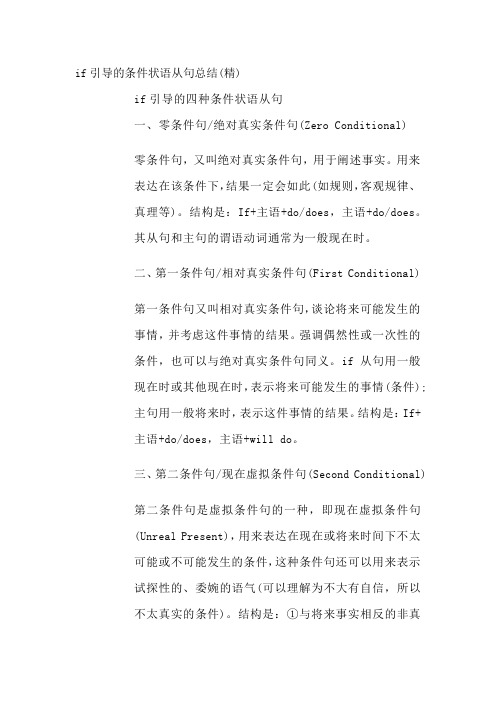
if引导的条件状语从句总结(精)if引导的四种条件状语从句一、零条件句/绝对真实条件句(Zero Conditional)零条件句,又叫绝对真实条件句,用于阐述事实。
用来表达在该条件下,结果一定会如此(如规则,客观规律、真理等)。
结构是:If+主语+do/does,主语+do/does。
其从句和主句的谓语动词通常为一般现在时。
二、第一条件句/相对真实条件句(First Conditional)第一条件句又叫相对真实条件句,谈论将来可能发生的事情,并考虑这件事情的结果。
强调偶然性或一次性的条件,也可以与绝对真实条件句同义。
if从句用一般现在时或其他现在时,表示将来可能发生的事情(条件);主句用一般将来时,表示这件事情的结果。
结构是:If+主语+do/does,主语+will do。
三、第二条件句/现在虚拟条件句(Second Conditional)第二条件句是虚拟条件句的一种,即现在虚拟条件句(Unreal Present),用来表达在现在或将来时间下不太可能或不可能发生的条件,这种条件句还可以用来表示试探性的、委婉的语气(可以理解为不大有自信,所以不太真实的条件)。
结构是:①与将来事实相反的非真实条件句是If+主语+should do/were to do/did,主语+would/should/could/might do;②与现在事实相反的非真实条件句是If+主语+did,主语+would/should/could/might+do。
四、第三条件句/过去虚拟条件句(Third Conditional) 第三条件句是表示与过去事实相反的虚拟语气,是用来表达如果(If)当时那样发生,另外一方面(当时)结果会如何。
通常是指过去的事情,带有一切已经太迟而不能够补救的意思。
结构是:If+主语+had done,主语+would/should/could/ might+have done。
if 条件句的时态搭配1.if从句用一般现在时,主句用一般将来时2.if从句用一般现在时,主句用may/might/canIf the fog gets thicker the plane may/might be diverted.3.if从句用一般现在时,主句用must/shouldIf you want to lose weight you must/should eat less bread.4.if从句用一般现在时,主句用一般现在时5.if从句用现在进行时,主句用一般将来时6.if从句用现在完成时,主句用一般将来时If you have finished dinner I’ll ask the waiter for the bill.。
条件句的类型及其表达方式
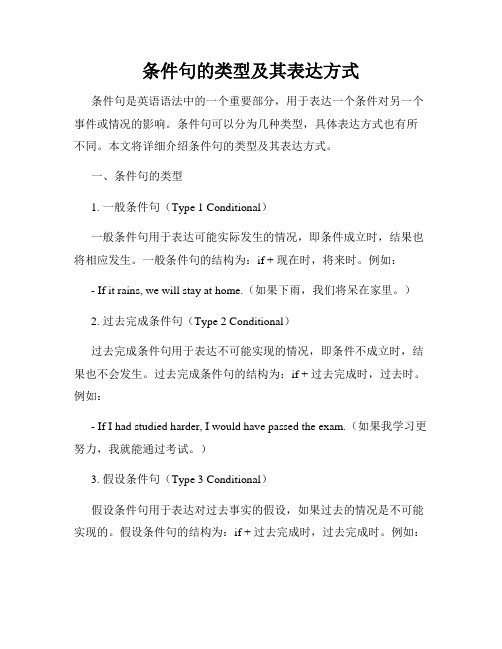
条件句的类型及其表达方式条件句是英语语法中的一个重要部分,用于表达一个条件对另一个事件或情况的影响。
条件句可以分为几种类型,具体表达方式也有所不同。
本文将详细介绍条件句的类型及其表达方式。
一、条件句的类型1. 一般条件句(Type 1 Conditional)一般条件句用于表达可能实际发生的情况,即条件成立时,结果也将相应发生。
一般条件句的结构为:if + 现在时,将来时。
例如:- If it rains, we will stay at home.(如果下雨,我们将呆在家里。
)2. 过去完成条件句(Type 2 Conditional)过去完成条件句用于表达不可能实现的情况,即条件不成立时,结果也不会发生。
过去完成条件句的结构为:if + 过去完成时,过去时。
例如:- If I had studied harder, I would have passed the exam.(如果我学习更努力,我就能通过考试。
)3. 假设条件句(Type 3 Conditional)假设条件句用于表达对过去事实的假设,如果过去的情况是不可能实现的。
假设条件句的结构为:if + 过去完成时,过去完成时。
例如:- If I had known you were coming, I would have prepared dinner.(如果我早知道你要来,我就会准备晚餐了。
)4. 零条件句(Zero Conditional)零条件句用于表达普遍真实的情况,即无论何时条件成立,结果都会相应发生。
零条件句的结构为:if + 现在时,现在时。
例如:- If you heat ice, it melts.(如果加热冰块,它会融化。
)二、条件句的表达方式1. 使用 if 引导条件句中的条件部分通常由 if 引导,表达方式简洁明了。
2. 使用 unless 替代 if not除了 if,条件句中条件部分也可以使用 unless 来表示否定意义,相当于 if not。
条件状语从句
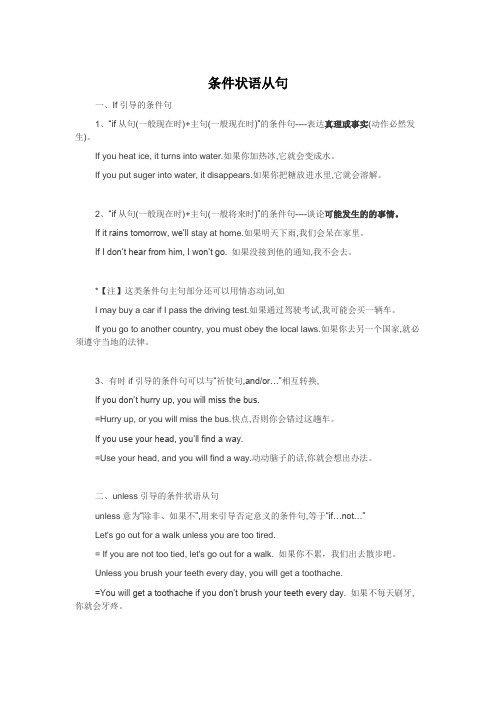
条件状语从句一、If引导的条件句1、“if从句(一般现在时)+主句(一般现在时)”的条件句----表达真理或事实(动作必然发生)。
If you heat ice, it turns into water.如果你加热冰,它就会变成水。
If you put suger into water, it disappears.如果你把糖放进水里,它就会溶解。
2、“if从句(一般现在时)+主句(一般将来时)”的条件句----谈论可能发生的的事情。
If it rains tomorrow, we’ll stay at home.如果明天下雨,我们会呆在家里。
If I don’t hear from him, I won’t go. 如果没接到他的通知,我不会去。
*【注】这类条件句主句部分还可以用情态动词,如I may buy a car if I pass the driving test.如果通过驾驶考试,我可能会买一辆车。
If you go to another country, you must obey the local laws.如果你去另一个国家,就必须遵守当地的法律。
3、有时if引导的条件句可以与“祈使句,and/or…”相互转换,If you don’t hurry up, you will miss the bus.=Hurry up, or you will miss the bus.快点,否则你会错过这趟车。
If you use your head, you’ll find a way.=Use your head, and you will find a way.动动脑子的话,你就会想出办法。
二、unless引导的条件状语从句unless意为“除非、如果不”,用来引导否定意义的条件句,等于“if…not…”Let's go out for a walk unless you are too tired.= If you are not too tied, let's go out for a walk. 如果你不累,我们出去散步吧。
用if引导的条件状语从句15个

用if引导的条件状语从句15个如果引导的条件状语从句是英语语法中非常常见的句型,用于表达某种条件下发生的情况。
下面将介绍15个以if引导的条件状语从句的相关内容。
1. **Zero Conditional**Zero conditional用于表达普遍真理或习惯性的动作,结构为if + 现在时,现在时。
例如:If you heat water to 100 degrees, it boils.2. **First Conditional**First conditional用于表达将来可能发生的事情,结构为if + 现在时,将来时。
例如:If it rains tomorrow, we will stay indoors.3. **Second Conditional**Second conditional用于表达与现在事实相反的假设,结构为if + 过去时,would/could/might + 原形动词。
例如:If I were rich, I would travel around the world.4. **Third Conditional**Third conditional用于表达与过去事实相反的假设,结构为if + 过去完成时,would/could/might + have + 过去分词。
例如:If I had studied harder, I would have passed the exam.5. **Mixed Conditional**Mixed conditional结合了第二和第三条件句的结构,用于表达过去的假设对现在的影响,或现在的假设对过去的影响。
例如:If I had known you were coming, I would have baked a cake.6. **Unless**Unless的意思是“除非”,引导的条件状语从句表示否定条件。
结构为unless + 句子,相当于if not。
人教版中考英语语法知识点If+引导的条件句+练习

语法专题:条件状语从句(1)if条件句:有可能性结果发生的行动,在这些句子中,动词的时态是不同的,if 引导的条件状语从句中,主句用一般将来时态,从句用一般现在时态(主将从现)If it doesn’t rain(从句), we’ll have a picnic tomorrow(主句).We’ll have a picnic tomorrow, if it doesn’t rain.(if引导的从句可置前可置后)(2)主祈从现(祈使句+if+一般现在时态)Put up your hands if you have any questions to ask. 如果你们有问题问的话,请举手。
当主语是you时,if 引导的条件状语从句可以与”祈使句+and/ or +简单句”进行句型转换。
And 表示句意顺承,or 表示转折,意为”否则”。
Take care , or you will fall off the tree. = If you don’t take care, you’ll fall off the tree. 小心,否则你会从树上掉下来。
(3)主情从现(情态动词+if +一般现在时态)If I get there early, I can see the doctor quickly.(4)句型:will do式be going to do式肯定从句If主语+动词+其他, 主语+will(won’t) do+其他. If主语+动词+其他, 主语+be(be not) going to do+其他.否定从句If主语+be+not+其他, 主语+will(won’t) do+其他. If主语+be+not+其他, 主语+be(be not) going to do+其他.If主语+don't/ doesn't +动词原形+其他, 主语+will(won’t) do+其他. If主语+don't/ doesn't +动词原形+其他, 主语+be(be not) going to do+其他.If the picture is silly, strange and colourful, you will remember it better.If I have time, I am going to visite you .I will go to the park if it doesn’t rain tomorrow . I won't go to the park if it rains tomorrow.专题精讲实战演练题型1:单项选择( ) 1. If the robot ___________ wrong,you can get a new one for free or get all your money back.A. wentB. goesC. would goD. will go ( ) 2. —We’ll go for a picnic if it ___________ on Sunday.—Wish you a lovely weekend.A. rainB. doesn’t rainC. won’t rainD. rains ( ) 3. I’ll do it better if the teacher ___________ me another chance.A. giveB. givesC. gaveD. will give( ) 4. If a polar bear ___________, it ___________ fish from the waterA. will be hungry;catchesB. is hungry;will catchB. is going to be hungry;catches D. is hungry;won’t catch( ) 5. If our government ___________ attention to controlling food safety now, our health ___________ in danger.A. won’t pay; isB. doesn’t pay; isC. won’t pay; will beD. doesn’t pay; will be( ) 6. We will go for a picnic if it___________ tomorrow.A. doesn’t rainB. wasn’t rainyC. won’t rainD. wasn’t raining( ) 7. If the pure water is heated to 100 centigrade degrees, it___________ boil.A. is going toB. willC. wouldD. is to ( ) 8. She will go to America___________ she has much free time and money.A. as long asB. butC. thoughD. although( ) 9. We will go to the West Lake___________ it doesn’t rain heavily tomorrow.A. ifB. unlessC. as long asD. once ( ) 10. I won’t call you, ___________ something unexpected happens.A. unlessB. whetherC. becauseD. While Keys: 1-5 BBBBD 6-10ABAAA题型2:以所给词的正确形式填空1. If he ________ (study) hard, he will get good grades.2. Everyone must wear uniforms. If you don't, they ___________ (let) you in.3. If you stand at the top of the mountain, you _________ (see) the view of the whole city.4. My grandfather will wear a pair of glasses if he__________ (read) newspapers.5. Please turn off the light if you ________ (leave) the classroom.6. We’ll go for a picnic unless it ________(rain) this Sunday.7. Mr Smith ________ (let) you know if he needs help.8. If you walk along the street, you ________ (see) many foreigners.9. If Mary ________ (ask) me for help,I will try my best to help her.10. I don't know if it will snow tomorrow. If it_______ (snow),we'll make snowmen. Keys:1. Studies 2.won’t let 3. will see 4. reads 5.leave6.doesn’t rain7.will let8.will see9. asks 10.snows直击中考题型1:单项选择( ) 1.—I wonder if your wife ________ to the party.—If your wife _________, so will mine.A. will go, goB. will go, goesC. goes, will goD. will go, will go ( ) 2. If he _________ in half an hour, we _________ wait for him.A. won't come, won'tB. won't come, don'tC. doesn't come, won'tD. will come, don't ( ) 3. I will send you an e-mail as soon as I_________ in Canada.A. arriveB. arrivedC. am arrivingD. will arrive( ) 4. If there ________ no buying and selling of animals, there _________ no killing in nature.A. is; will beB. will be; will beC. is; isD. will be; is ( ) 5. You can’t watch TV ________ you finish your homework.A. beforeB. ifC. whileD. asKeys:1-5:ACAAA。
四年级英语条件句判断单选题20题

四年级英语条件句判断单选题20题1.If it is sunny tomorrow, we ____ go to the park.A.willB.wouldC.canD.must答案:A。
本题考查if 引导的一般条件句中,主将从现的用法。
if 引导的条件状语从句用一般现在时,主句用一般将来时。
选项A“will”表示将来;选项B“would”用于过去将来时或者虚拟语气;选项C“can”表示能够;选项D“must”表示必须。
2.If I have time, I ____ help you with your homework.A.willB.wouldC.canD.must答案:A。
同样是考查if 引导的一般条件句中,主将从现的用法。
选项A“will”表示将来;选项B“would”用于过去将来时或者虚拟语气;选项C“can”表示能够;选项D“must”表示必须。
3.If you are hungry, you ____ eat some snacks.A.willB.wouldC.canD.must答案:C。
本题考查情态动词的用法。
if 引导的条件句表示假设,如果你饿了,你可以吃一些零食。
选项A“will”表示将来;选项B“would”用于过去将来时或者虚拟语气;选项C“can”表示能够,可以;选项D“must”表示必须。
4.If it rains tomorrow, we ____ stay at home.A.willB.wouldC.canD.must答案:A。
if 引导的一般条件句,主将从现。
如果明天下雨,我们将待在家里。
选项A“will”表示将来;选项B“would”用于过去将来时或者虚拟语气;选项C“can”表示能够;选项D“must”表示必须。
5.If you study hard, you ____ get good grades.A.willB.wouldC.canD.must答案:A。
if引导的条件句三种情况

1•对现在虚拟:条件句:一般过去时主句:could/would/+动词原形。
2•对过去虚拟:条件句:过去完成时主句:could/would have done0 3•对将来虚拟:条件句:l.were to do ;2.should do ; 3•—般过去时:主句could/would/+动词原形。
—、对现在情况的虚拟条件从句中谓语动词用一般过去式,主句用,f would/should/might/could+动词原形”形式,表示对现在不可能实现情况的假想。
If I were you,I would choose to work in a small town.如果我是你f我会选择在小城镇工作。
(事实上我不是你)If I had a map now,we could easily get out of the forest.如果现在有地图,我们能很容易地走出森林。
(事实上是现在没有地图)注意:在条件从句中,如果谓语动词是be的形式,不管主语是单数还是复数,书面语中用we©而口语中如果是单数,也可以用was,不过在if I were…中一般用were.If the world were perfect,how could we enjoy the pleasure and comfort of being successful?世界若完美,我们如何能尝到创造成功的快慰?二、对过去情况的虚拟条件从句中谓语动词用过去完成式,主语用,/would/could/should/might+have+动词的过去分词"形式。
If it had not been for your help yesterday^ could not have caught the bus.如]果昨天没有你的帮助,我不会赶上公交车。
(事实是你昨天已经帮助了我,所以我赶上了车)三、对将来情况的虚拟在表示与将来事实相反的条件从句中,谓语动词可用should do,were to do或动词的过去式三种形式表示,但意义略有不同。
详细版if的用法
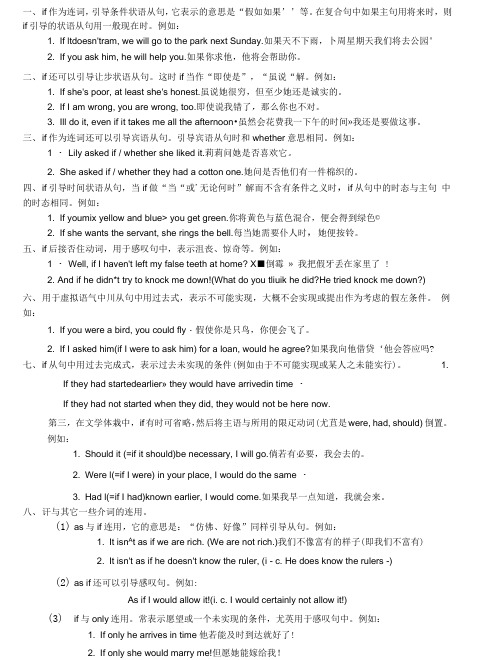
一、i f作为连词,引导条件状语从句,它表示的意思是“假如如果’’等。
在复合句中如果主句用将来时,则if引导的状语从句用一般现在时。
例如:1. If ltdoesn'tram, we will go to the park next Sunday.如果天不下雨,卜周星期天我们将去公园°2. If you ask him, he will help you.如果你求他,他将会帮助你。
二、i f还可以引导让步状语从句。
这时if当作“即使是”,“虽说“解。
例如:1. If she's poor, at least she's honest.虽说她很穷,但至少她还是诚实的。
2. If I am wrong, you are wrong, too.即使说我错了,那么你也不对。
3. Ill do it, even if it takes me all the afternoon•虽然会花费我一下午的时间»我还是要做这事。
三、i f作为连词还可以引导宾语从句。
引导宾语从句时和whether意思相同。
例如:1 ・ Lily asked if / whether she liked it.莉莉问她是否喜欢它。
2. She asked if / whether they had a cotton one.她问是否他们有一件棉织的。
四、i f引导时间状语从句,当if做“当“或'无论何时”解而不含有条件之义时,if从句中的时态与主句中的时态相同。
例如:1. If youmix yellow and blue> you get green.你将黄色与蓝色混合,便会得到绿色©2. If she wants the servant, she rings the bell.每当她需要仆人时,她便按铃。
五、i f后接否住动词,用于感叹句中,表示沮丧、惊奇等。
例如:1 ・ Well, if I haven't left my false teeth at home? X■倒霉» 我把假牙丢在家里了 !2. And if he didn*t try to knock me down!(What do you tliuik he did?He tried knock me down?)六、用于虚拟语气中川从句中用过去式,表示不可能实现,大概不会实现或提出作为考虑的假左条件。
八年级上册if引导的条件句

八年级上册if引导的条件句
以下是有关八年级上册if引导的条件句的总结:
1. 如果主句用一般将来时,if从句要用一般现在时代替将来时。
2. 在含有条件状语从句的复合句中,如果主句描述将来动作,一般将来时态不变,只是把if引导的条件状语从句用“主将从现”的规则变为时间状语从句。
3. 如果if引导的条件状语从句中的主语与主句主语一致或是人称代词主格,且从句谓语为系动词be时,可以省略从句的主语和系动词be。
4. 如果if引导的条件状语从句中有助动词had, could, would, should 等时,可以省略连词if,直接使用倒装语序表示条件。
请注意,以上规则可能因教材和教师的要求而有所不同。
在学习和练习使用if引导的条件句时,建议参考教材和教师的指导。
if引导的条件句的用法
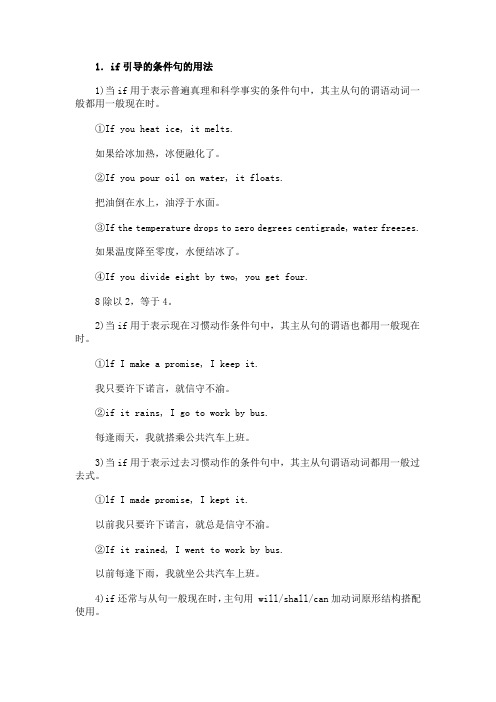
1.if引导的条件句的用法1)当if用于表示普遍真理和科学事实的条件句中,其主从句的谓语动词一般都用一般现在时。
①If you heat ice, it melts.如果给冰加热,冰便融化了。
②If you pour oil on water, it floats.把油倒在水上,油浮于水面。
③If the temperature drops to zero degrees centigrade, water freezes.如果温度降至零度,水便结冰了。
④If you divide eight by two, you get four.8除以2,等于4。
2)当if用于表示现在习惯动作条件句中,其主从句的谓语也都用一般现在时。
①lf I make a promise, I keep it.我只要许下诺言,就信守不渝。
②if it rains, I go to work by bus.每逢雨天,我就搭乘公共汽车上班。
3)当if用于表示过去习惯动作的条件句中,其主从句谓语动词都用一般过去式。
①lf I made promise, I kept it.以前我只要许下诺言,就总是信守不渝。
②If it rained, I went to work by bus.以前每逢下雨,我就坐公共汽车上班。
4)if还常与从句一般现在时,主句用 will/shall/can加动词原形结构搭配使用。
①If you go to England, you will have to learn English .如果你到英国去,就必须学英语。
②If it is fine tomorrow , we can have a picnic somewhere .如果明天晴天,我们可以去野餐。
5)if从句还常出现以下结构,主句祈使句,从句一般现在时。
①If you wake up before me, give me a call.如果你比我醒得早,就叫醒我。
if引导的条件句
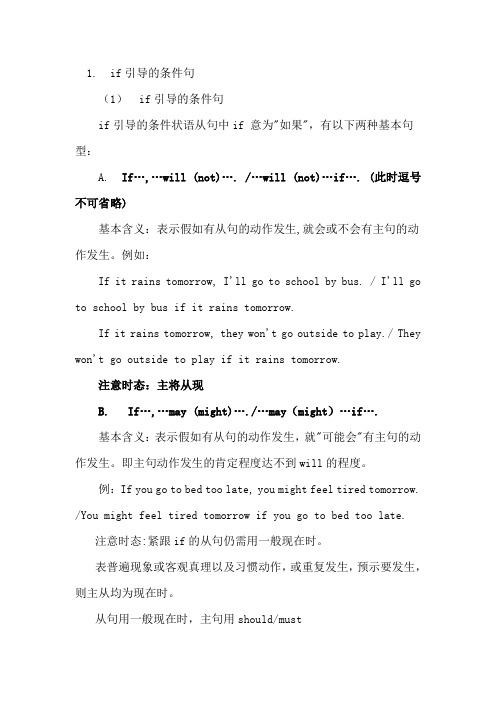
1. if引导的条件句(1)if引导的条件句if引导的条件状语从句中if 意为"如果",有以下两种基本句型:A. If…,…will (not)…. /…will (not)…if…. (此时逗号不可省略)基本含义:表示假如有从句的动作发生,就会或不会有主句的动作发生。
例如:If it rains tomorrow, I'll go to school by bus. / I'll go to school by bus if it rains tomorrow.If it rains tomorrow, they won't go outside to play./ They won't go outside to play if it rains tomorrow.注意时态:主将从现B. If…,…may (might)…./…may(might)…if….基本含义:表示假如有从句的动作发生,就"可能会"有主句的动作发生。
即主句动作发生的肯定程度达不到will的程度。
例:If you go to bed too late, you might feel tired tomorrow. /You might feel tired tomorrow if you go to bed too late.注意时态:紧跟if的从句仍需用一般现在时。
表普遍现象或客观真理以及习惯动作,或重复发生,预示要发生,则主从均为现在时。
从句用一般现在时,主句用should/must1. If he hard, he will get good grades.A. studyB. studiesC. will studyD. studied2. I want to know if Mary to the party tomorrow.A. goB. wentC. will goD. goes3. Everyone must dress up. If you , they won’t let you in.A. don’tB. won’tC. can’tD. mustn’t4. Mary will go to Sanya if she a five-day trip.A. haveB. hadC. will haveD. has5. If he comes late, he will miss the train.A. andB. soC. /D. or。
if 引导的条件句

if 引导的条件句if引导的条件句表示在某种条件下,会导致另一事发生。
句式为if + 从句,主句。
中文意思是“如果某事发生(或不发生),另一事就(不)发生”。
通常分以下两种情形:一、真实条件句1. if从句和主句都用一般现在时,表示客观真理或习惯和持续发生的事情。
如:If the moon goes near the earth, the tide goes high. 如果月亮离地球距离近,潮水就高。
2. if从句用一般现在时,主句用一般将来时,表示从句中的动作如果发生,那么主句中的动作也将发生。
如:If it stops raining later this afternoon, we will eat out. 如果今天下午晚些时候雨能停,我们就出去吃饭。
3. if从句用一般现在时,主句用祈使句,表示给某人提建议或命令某人做某事,及提出建议或请求。
如:If you are not likely to be in town, please let me know. 如果你不可能在城里,请让我知道。
二、虚拟条件句虚拟条件句,也称非真实条件句,表示在某种假想的条件下,将导致某事发生。
从句中所陈述的事情仅仅只是说话者的想法,不是事实,也不可能发生。
1. if从句用一般过去时(did / were),主句用would / could / should / might + do,表示现在不可能发生的事情,if 从句中所陈述的事情与现在的事实相反。
如:If I were Liu Xiang, I would train hard for the 2008 Olympic Games.如果我是刘翔,我会为了2008年奥运会努力训练。
2. if从句用一般过去时(did / were或were to + do),主句用would / could / should / might + do。
表示将来不可能发生的事情,if 从句中所陈述的事情与将来的事实相反。
if从句的三种用法
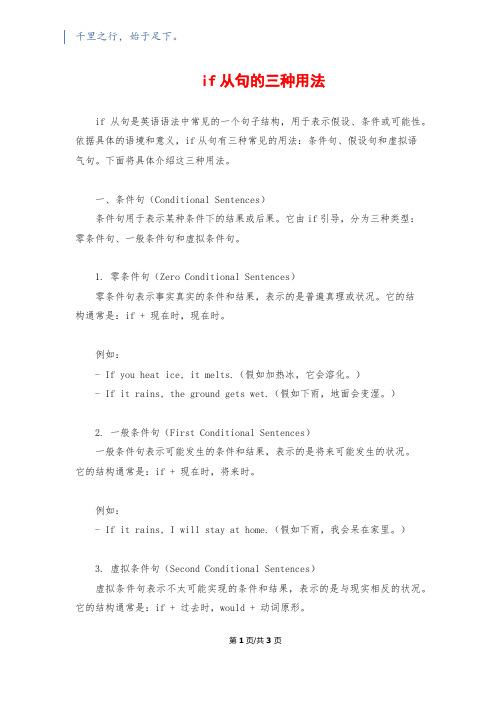
千里之行,始于足下。
if从句的三种用法if从句是英语语法中常见的一个句子结构,用于表示假设、条件或可能性。
依据具体的语境和意义,if从句有三种常见的用法:条件句、假设句和虚拟语气句。
下面将具体介绍这三种用法。
一、条件句(Conditional Sentences)条件句用于表示某种条件下的结果或后果。
它由if引导,分为三种类型:零条件句、一般条件句和虚拟条件句。
1. 零条件句(Zero Conditional Sentences)零条件句表示事实真实的条件和结果,表示的是普遍真理或状况。
它的结构通常是:if + 现在时,现在时。
例如:- If you heat ice, it melts.(假如加热冰,它会溶化。
)- If it rains, the ground gets wet.(假如下雨,地面会变湿。
)2. 一般条件句(First Conditional Sentences)一般条件句表示可能发生的条件和结果,表示的是将来可能发生的状况。
它的结构通常是:if + 现在时,将来时。
例如:- If it rains, I will stay at home.(假如下雨,我会呆在家里。
)3. 虚拟条件句(Second Conditional Sentences)虚拟条件句表示不太可能实现的条件和结果,表示的是与现实相反的状况。
它的结构通常是:if + 过去时,would + 动词原形。
第1页/共3页锲而不舍,金石可镂。
例如:- If I had a lot of money, I would travel around the world.(假如我有很多钱,我会环游世界。
)二、假设句(Suppositional Sentences)假设句用于表示假设、猜想或非真实状况。
它由if引导,通常是对将来可能的状况进行推想或假设。
1. 假如假设是可能的(Possible Condition)这种状况下,if从句和主句中的动词形式一般都使用现在时。
if来引导的句子

"if" 是英语中的一个条件状语从句的引导词,它通常用来表示某个条件下的结果或假设。
以下是一些使用 "if" 引导的句子示例: 1. "If you study hard, you will pass the exam." (如果你努力学习,你会通过考试。
)
2. "If it rains tomorrow, we will stay at home." (如果明天下雨,我们会呆在家里。
)
3. "If the car breaks down, we will have to walk." (如果车坏了,我们只能走路。
)
4. "If I had more time, I would finish the project." (如果我有更多的时间,我会完成这个项目。
)
5. "If you want to succeed, you must work hard." (如果你想成功,你必须努力工作。
)
请注意,"if" 引导的从句通常放在主句之后,并且使用逗号与主句分隔。
例如:
"I will go to the party if my friend is going too." (如果我的朋友也去,我会去参加派对。
)。
四年级英语条件句判断练习题20题

四年级英语条件句判断练习题20题1.If it is sunny tomorrow, we will go to the park.A.go to the zooB.stay at homeC.do homework答案解析:答案为A。
本题考查if 引导的一般条件句。
如果明天天气晴朗,我们会去公园,去动物园也是一种在晴天可能进行的户外活动;B 选项待在家里通常不是晴天的首选活动;C 选项做作业与晴天与否关系不大。
2.If I have time, I will read a book.A.play gamesB.watch TVC.do housework答案解析:答案为A。
如果我有时间,我会看书,看书和玩游戏都是在有时间时可以进行的活动;B 选项看电视不一定和有时间直接相关;C 选项做家务通常不是在有时间时首先想到的活动。
3.If it rains, we will stay indoors.A.go for a walkB.play footballC.watch a movie答案解析:答案为C。
如果下雨,我们会待在室内,看电影是室内活动;A 选项去散步通常在不下雨时进行;B 选项踢足球一般在户外,下雨时不适合。
4.If I finish my homework early, I can play with my friends.A.go to bed earlyB.read another bookC.watch cartoons答案解析:答案为C。
如果我早早完成作业,我可以和朋友玩,看动画片也是完成作业后的一种娱乐方式;A 选项早睡觉与完成作业后和朋友玩不相关;B 选项再读一本书不是通常完成作业后马上进行的活动。
5.If it is cold outside, we will wear coats.A.wear shortsB.wear sandalsC.wear sweaters答案解析:答案为C。
- 1、下载文档前请自行甄别文档内容的完整性,平台不提供额外的编辑、内容补充、找答案等附加服务。
- 2、"仅部分预览"的文档,不可在线预览部分如存在完整性等问题,可反馈申请退款(可完整预览的文档不适用该条件!)。
- 3、如文档侵犯您的权益,请联系客服反馈,我们会尽快为您处理(人工客服工作时间:9:00-18:30)。
If 引导的一般条件状语从句--------By the teacher: Jerry Zhang条件状语从句概念:在复合句中,由从句表示的状语叫做状语从句。
它可以用来修饰主语中的动词.形容词.副词等。
根据它表达的意思,状语从句可以分为时间状语从句,地点状语从句,条件状语从句,比较状语从句,目的状语从句,结果状语从句和让步状语从句等。
由连接词if或unless引导的状语从句叫做条件状语从句。
(注意:在含有条件状语从句的复合句中,如果主句是一般将来时态,从句要用一般现在时[主将从现原则]经典语句:If it doesn't rain tomorrow, we will go to the zoo. If you open the door,I will come in.if 引导的条件状语从句主句用一般将来时,if 从句用一般过去时。
We will go to the park if it is fine tomorrow.如果明天天好的话我们就去公园。
We will go traveling if we have time tomorrow.如果明天我们有时间我们就去旅行。
主句祈使句,if 从句用一般现在时。
Please call me if you need help. 如果你需要帮助请打电话给我。
Sing a song if you feel happy. 如果感到快乐就唱首歌吧!主句含有情态动词,if 从句用一般现在时。
You can make a lot of money if you run a company.如果你经营一家公司的话你会装很多钱。
You can get number one if you study hard. 如果你努力学习你就可以得第一。
—Mary, what about going boating if it doesn’t rain? 玛丽,如果明天不下雨,我们就划船好吗?—Good idea. 好主意。
Unit5练习题:单词1. If you wear your j___________ to school, the teacher won’t let you in.2. If you bring food to school, the teacher will t_________ it away.3. If you are on duty, you must c____________ up the classroom.4. The f__________ in the garden smells nice.5. I want to have a birthday party, please help me o___________ it.词的适当形式填空1. If you wear jeans, we ____________ (not let you in.2. Yao Ming is one of the most famous basketball ___________(play in the world.3. Mr Black enjoys __________ to many places of interest.4. If you go to the party, you ______________ (have a great time.5. Wang Lin did very ____________ (bad in 100-meter race.6. Tom says he _________ (play football at ten yesterday morning.7. If he ___________ (come tomorrow, I ____________(call.8. What _______ you _______ (do if you ________ (be A teacher?9. While he _____________ (watch TV yesterday, I __________ (do my homework.10. Look at the clouds. It _________ (rain.11. Kate usually __________ (watch TV on Sundays.12. Listen! Who ___________ (sing in the next room?13. They ___________ (get to Shanghai two days ago.14. If it __________ (be fine next Sunday, we _________ (help the farmers pick apples.15. How soon ________ you ________ (finish the work?16. Let me ________(tell you _______ (say it like this.17. Don’t make any noise. The baby ________- (sleep now.18. It _________ (take me half an hour __________(learn this text by myself yesterday.19. He with his friend ________ (go to help Grandma Li three times a week.20. They are famous ____________ (agent.21. My mother is watering these _____________ (flower.22. He has a lot of ___________ (chance to join the team.23. He is _________ (explain the problem to me.24. Who can tell me the reasons ___________(against becoming a professional football player?25. If you _________(stay at home tomorrow, you’ll see him.26. If you drive to Shanghai next week, your parents______________(be angry.27. If he ___________(ride his bike to go to school tomorrow, he will be late.28. If it ____________ (not rain tomorrow, we will meet you.29. If you ____________ (not help me, I won’t let you come in.30. Do you know what _________-(happen inten years.31. There __________ (be a speech by our headmaster tomorrow afternoon in our school.32. The girl ___________ (shop when I came in.33. The boy ___________(climb the hill at this time yesterday.根据括号内的要求,改写下列各句,每空一词。
1. Run and shout at the party.(改为否定句) _______ run_______ shout at the party.2. I’ll go to your birthday party if I’m free.(对划线部分提问)_______ will you ________ if you are free?3. Can you mend your bike?(同义句)________ you _________ ______ mend your bike?4. They’ll ask you some questions.(一般疑问句)_______ they ask you ________ questions?5. If I’m a teacher, ___________________________(完成句子)6. If he doesn’t help me, I won’t buy the car,(改为简单句)I won’t buy thecar___________ __________ help.7. He will go home with his father. I think.(合并为一句) _________________________________.7. He can finish the work. He ______ ______ ______ the work.8. He was watching TV when I got home.(提问)选用方框中所给词的正确形势填空take away, make a living, all the time, be able to, too much1. If you drink _________________, you won’t drive a car.2. He ______________ his book from me yesterday.3. He _____________ by singing for others.4. If you study harder, you _______________ pass the exam.5. They didn’t get out. They were watching TV_______________.翻译下列句子1.如果我明天有时间,我就和你一起玩。
If I ___ ____ tomorrow, I _____ _____ with you.2.今天晚上如果有足球赛,他们就不上学了。
If there ___ a football match, they ______ _______to school.3.张鹏不知道今天下午是否玩电脑。
